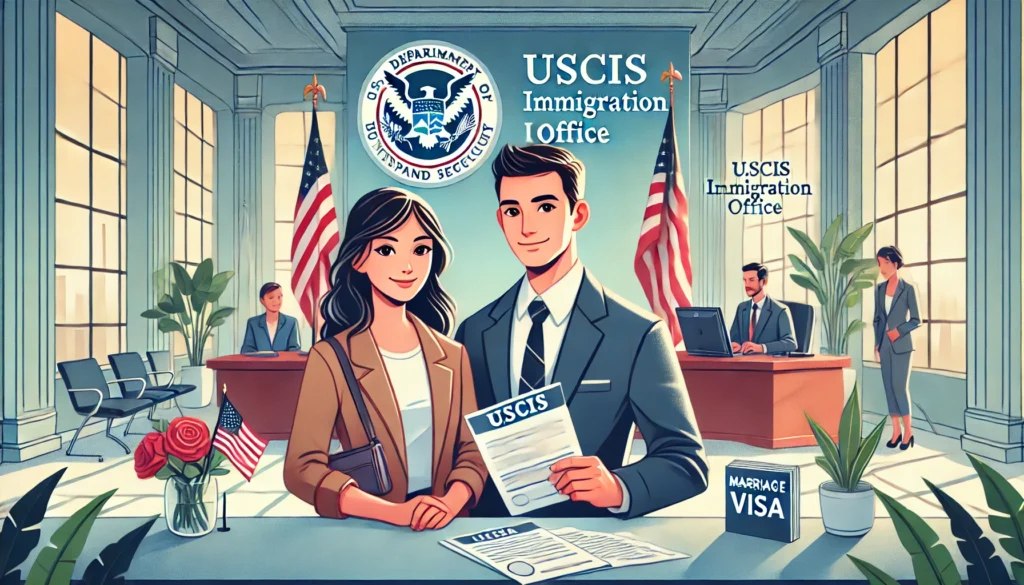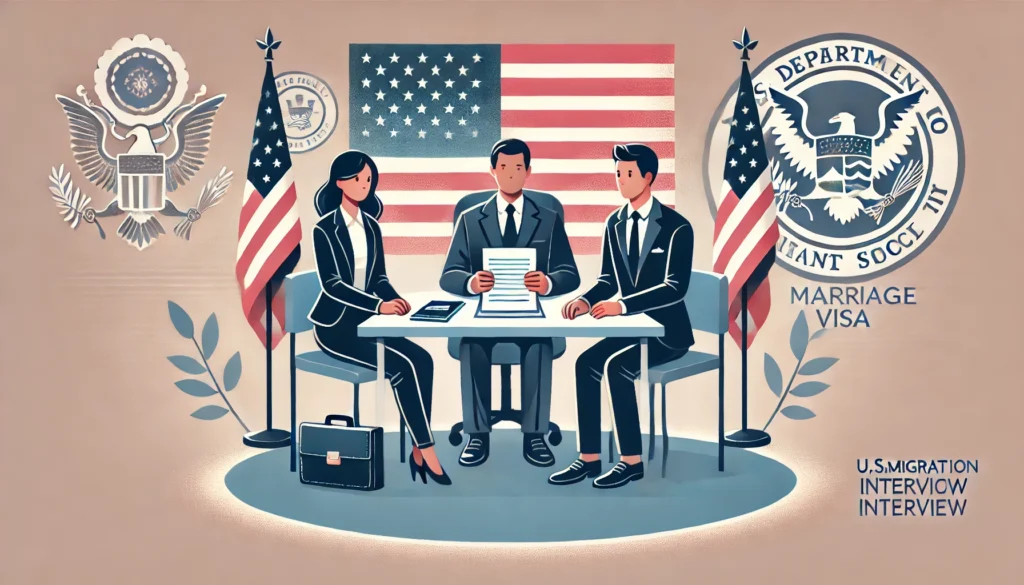Introduction
Applying for a marriage-based visa in the USA requires thorough preparation, including compiling a comprehensive set of documents. These documents serve to verify your relationship, meet eligibility requirements, and comply with immigration laws. Missing or incomplete paperwork can delay or jeopardize your application. This guide provides an in-depth look at the essential documents you need for a marriage-based visa, helping you stay organized and prepared.
1. Proof of Relationship
Why It Matters:
USCIS requires evidence to confirm that your marriage is genuine and not solely for immigration purposes. Proof of a bona fide relationship is crucial for visa approval.
Key Documents:
- Marriage Certificate: A legally recognized certificate showing the date, location, and validity of your marriage.
- Photographs: Pictures from your wedding, trips, and other significant events as a couple.
- Communication Records: Emails, texts, social media interactions, or call logs.
- Affidavits from Friends and Family: Statements affirming the authenticity of your relationship.
- Shared Financial Accounts: Bank statements, credit card accounts, or joint loans.
- Joint Lease or Mortgage Agreements: Evidence of shared living arrangements.
- Travel Records: Tickets and itineraries for trips taken together.
2. Identification Documents
Why It Matters:
Both spouses must provide valid identification to prove their identities and legal status.
Key Documents:
- Passports: Valid passports for both the U.S. citizen or permanent resident and the foreign spouse.
- Birth Certificates: Official birth certificates for both spouses.
- Previous Divorce Decrees (if applicable): Documents showing the legal end of any prior marriages.
- Government-Issued IDs: Driver’s licenses or other national identification cards.
3. Immigration Forms
Why It Matters:
These forms are the foundation of your marriage-based visa application and must be completed accurately.
Key Forms:
- Form I-130: Petition for Alien Relative (filed by the U.S. citizen or permanent resident).
- Form I-485: Application to Adjust Status (if applying from within the U.S.).
- Form DS-260: Immigrant Visa Application (if applying from abroad).
- Form I-864: Affidavit of Support to prove financial ability to support the immigrant spouse.
- Form I-765: Application for Employment Authorization (optional).
- Form I-131: Application for Advance Parole (optional, for travel while awaiting green card approval).
4. Financial Evidence
Why It Matters:
The sponsoring spouse must demonstrate the financial capacity to support the immigrant spouse and prevent them from becoming a public charge.
Key Documents:
- Tax Returns: The last three years of tax returns for the sponsoring spouse.
- Pay Stubs: Recent pay stubs to prove current employment.
- Employment Verification Letter: A letter from the sponsor’s employer confirming their job and salary.
- Bank Statements: Recent statements showing sufficient funds.
- Proof of Assets: Property deeds, investment accounts, or other assets if income is insufficient.
5. Medical Examination Records
Why It Matters:
The foreign spouse must complete a medical examination by a USCIS-approved physician to ensure they meet health requirements.
Key Documents:
- Form I-693: Report of Medical Examination and Vaccination Record, completed by the examining physician.
- Vaccination Records: Proof of required immunizations.
- Sealed Envelope: The physician will provide results in a sealed envelope to submit with the application.
6. Criminal and Background Records
Why It Matters:
USCIS reviews criminal history and background checks to ensure the applicant is eligible for a visa.
Key Documents:
- Police Certificates: Records from any country where the foreign spouse has lived for more than six months.
- Court Records: Documents detailing arrests, charges, or convictions (if applicable).
- FBI Clearance (if applicable): For spouses living in the U.S., a fingerprint-based background check may be required.
7. USCIS Notices and Correspondence
Why It Matters:
Keeping track of all correspondence with USCIS ensures you stay informed about your case status and requirements.
Key Documents:
- Receipt Notices: Proof of form submissions and fee payments.
- Appointment Notices: Letters scheduling biometrics, interviews, or other appointments.
- Requests for Evidence (RFEs): Any additional documentation requested by USCIS.
- Case Updates: Emails or letters regarding the status of your application.
8. Proof of Joint Life
Why It Matters:
Additional evidence of a shared life helps reinforce the legitimacy of your relationship.
Key Documents:
- Utility Bills: Jointly addressed bills for electricity, water, internet, or other services.
- Insurance Policies: Health, auto, or life insurance policies listing both spouses as beneficiaries or holders.
- Photographs: Continued photographic evidence beyond the wedding.
- Children’s Birth Certificates (if applicable): Birth certificates listing both spouses as parents.
Tips for Organizing Your Documents
- Create a Checklist: Use this guide to make a checklist and track your progress.
- Label and Categorize: Clearly label each document and organize them into categories such as identification, financial, and relationship proof.
- Make Copies: Create copies of all documents for your records and USCIS submissions.
- Prepare a Binder: Use a binder or folder to keep documents neat and accessible during interviews or appointments.
Conclusion
Gathering the right documents for a marriage-based visa application is a vital step in the immigration process. These documents not only establish the legitimacy of your relationship but also demonstrate your compliance with U.S. immigration laws. Proper preparation and organization can streamline your application, ensuring that the process progresses smoothly and efficiently, while reducing the risk of delays or denials that can arise from incomplete or inaccurate submissions.
Taking the time to understand what is required and preparing each document meticulously will not only build a stronger case but also give you confidence during interviews and interactions with immigration officials. Think of this as laying a solid foundation for your future life together in the United States, where every piece of evidence contributes to the authenticity and transparency of your application.
Additionally, staying proactive by keeping copies of all submissions, tracking deadlines, and organizing your paperwork systematically can save you time and stress. Remember, a well-prepared application speaks volumes about your commitment to following the legal process and can significantly enhance your chances of success. With thorough planning and attention to detail, you and your spouse can take this important step toward a new chapter in your lives together in the United States.


